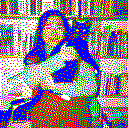Self Design Committee
Presented at The Self Design Academy, at MU Hybrid Art Space, Eindhoven
To design oneself is partly to design the digital representation of oneself. One of the most obvious ways of doing this is through manipulating our facial images and videos by the use of face filters. Face filters enable us to digitally become something else, beyond the boundaries of person, gender, race, age, species. Noam Youngrak Son experimented with this by using the face filter Becoming Noam (2020), which applies their facial image on the face of other people. It provides them an opportunity to act or to make statements as the artist themselves, who in their turn can reproduce and spread themself online.
Your digital identity may not only be owned by yourself but shared among a wide range of people who can access the face filter. The self becomes polyvocal and self-design becomes a collective task with distributed agency and responsibility. The users of the face filter could be considered as a committee, an organisation of multiple "themselves" to make various political decisions that one encounters while portraying themself online. Self-design, which seemed like a black box, becomes more transparent and democratic through this process.
I asked them to become me through the face filter that I made and discuss with the other “myselves” about the questions I’ve frequently asked myself while displaying myself publicly on social media:
- What should I do if I can’t sleep because I can’t stop scrolling through my Instagram feed?
- How much should I care about the number of likes I get?
- Can I post an ugly selfie on Instagram?
- Is it moral to proudly post a photo of meat on Instagram?
- Should I make my account private or public?
- Should I follow back a stranger that follows me?
- Do I want to stay in my filter bubble?
- Does it make sense to keep using Instagram while politically disagreeing with the corporation that owns Instagram?
- Do I have to keep sharing political posts on Instagram even though I’m feeling skeptical about whether Instagram-activism can actually make change?
The discussions are still ongoing, and they will continue indefinitely because self-design is a lifelong process. Or they can even last after my biological death, as long as I am remembered by the digital platforms I exist on. You can witness or even participate in those discussions on the official Instagram page of the committee.
Find out more from an article on The Hmm Dossier, The Self Design Committee: How a face filter might or might not democratize self-design
Portfolio - Noam Youngrak Son
For a more visual overview, check my Instagram.
| Image | Title | Category | Year | Notes | Funding |
|---|
Noam Youngrak Son is a communication designer, design theorist, and cultural worker. Their design work encompasses small-scale publishing projects, speculative worldbuilding, workshops, lectures, writing, net art, and occasional performative interventions. As a cultural worker, they have co-organized the Ghent-based queer publishing collective Bebe Books since 2021. Son has expanded their focus from design to theory in order to critically engage with the ontology of the design industry, media, and broader material culture. This turn is informed by their observations of cultural assemblages that echo the extractive operations of capitalism on racialized and more-than-human populations. They are particularly attentive to the interconnected notions of speculation—both as an open artistic approach and as a process of value increase in capitalism. They research the tendency of the former in design to be subjugated by the latter and explore alternative methods for speculative design practices to realize their transindividual potential through collective organization and workshop facilitation. In this process, Son utilizes queer publishing as a technology for mobilizing attention beyond the financialized “scarce resource” of the attention economy. In this context, publishing extends beyond mere printed matter to encompass the maintenance of communities and the cultivation of interspecies relationships. The term "queer" here is not used as a statement of identity but as a process—small yet collective strategies of publishing that challenge the modern myth of the heroic designer.
Subscribe to the newsletter
